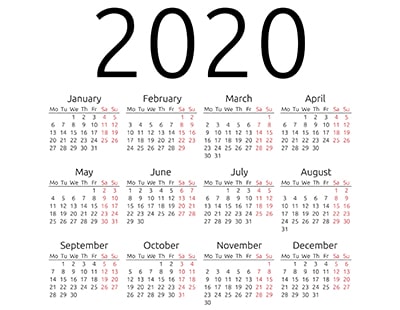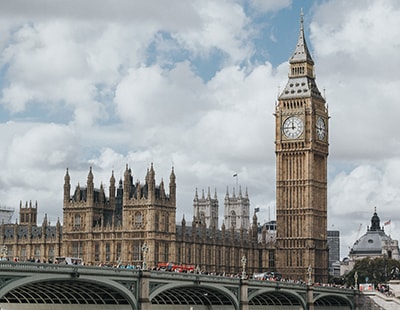“This year is likely to be another difficult year politically, as Brexit continues to dominate the agenda, and this is bound to affect the housing market,” Mike Scott, chief property analyst at Yopa, said.
But there are genuine signs of optimism among the gloom as we enter a new decade, with evidence of a sudden uplift in buyer demand now the general election is over.
According to Rightmove, demand across the UK from prospective buyers increased by 28% in the four days after the election compared to the same four days in 2018, with the biggest jump recorded in London, up 54% year-on-year.
 Rightmove’s housing market analyst, Miles Shipside, said: “Some of the pent-up demand from the ‘wait-and-see’ buyers is starting to show signs of being released.”
Rightmove’s housing market analyst, Miles Shipside, said: “Some of the pent-up demand from the ‘wait-and-see’ buyers is starting to show signs of being released.”
“With a bit more political certainty than before we could be shaping up for an active January market,” he added.
Many analysts forecast that there will be growth in 2020, owed in part to what some are describing as a ‘Boris bounce’ in the economy, and thus a healthier housing market, as we break away from political ambiguity. Although it remains to be seen if this potential boost in the market is likely to be short-lived.
John Goodall, CEO of Landbay, said: “The ‘Boris bounce’ is expected to put an end to the recent stalemate in the property market, offering confidence to buyers and sellers alike to make a move.
“Demand has been humbled by instability, so 2020 should bring an early ‘spring bounce’ as those who have sat on their hands are spurred into action.”
Transactions
Residential property transactions increased marginally in November to hit 102,050, up 3.2% year-on-year, according to seasonally adjusted figures from HMRC.
The total maintained the generally consistent trend of around 100,000 transactions per month, or 1.2 million per year, that has been in place since 2014, but greater political certainty could lead to a slight increase in property sales in 2020.
Lucy Pendleton, founding director of James Pendleton, said: “There’s every sign on the high street that buyers and sellers are returning to the fold.
“The UK is certainly experiencing a resurgence in activity but we won’t know for a couple of months whether, on balance, this will begin to push prices higher or whether greater supply will have a moderating influence while brokers and agents enjoy a pick-up in volumes.”
While the Brexit cloud has not yet lifted, Jonathan Hopper, managing director of Garrington Property Finders, agrees that last month’s decisive election result has done “wonders for sentiment in the market”.
He commented: “Would-be buyers and sellers who had held off are now coming out of the woodwork.
“It is premature to talk of a return to business as usual, but early signs are that the log-jam of limited supply and intensely cautious demand is breaking.”
But RICS predicts that there will be little change in sales volumes for the year ahead, despite fresh certainty around Brexit.
The surveyer trade body wants to see the government start prioritising housing policy, in order to inject activity into the market and create a favourable environment for housebuilders to help address the housing crisis.
Hew Edgar, RICS UK head of engagement and cities strategy, said: “It is imperative that the new administration hits the ground running and makes headway into the plethora of housing pledges within the Conservative manifesto – ensuring they actually deliver holistic policy, as well as moving the housing sector forward with a consistent and long-term approach.”
Housebuilding
The latest government data shows that net housing additions hit 241,000 in 2018/19, above the pre-recession peak, but housebuilders are still not building enough new homes, and this has led to an affordability crisis and overcrowding in many parts of the UK, especially in England - where there has been a slowdown in the residential construction market.
The latest data provided by Glenigan shows that the number of properties in the planning pipeline in England dropped in 2019 for the first time since the end of the financial crisis, with 365,200 homes receiving planning consent in the year to September 2019 - a fall of 3% from the 377,700 homes that were approved in the previous year.
To help fix the dysfunctional housing market and make properties more accessible, the Conservatives, in their election manifesto, promised to increase housebuilding levels by delivering an average of 300,000 new build homes a year by the mid-2020s.
Jeremy Leaf, a north London estate agent, said: “We will be looking to the government to improve supply, particularly of affordable housing, and a concentration on improving transactions not prices as the latter is not in anyone’s interest, particularly first-time buyers. We would like to see more emphasis on Help to Buy rather than Help to Sell.”
House prices
The housing market was once again plagued by a shortage of stock last year, with average stock levels on estate agents’ books hitting a new all-time low in June amid Brexit uncertainty, and stretched affordability in parts of the country.
But despite the lack of impetus in sales activity, the decisive Tory election victory suggests that property prices will rise this year, although growth is likely to be modest.
Richard Donnell, research and insight director at Zoopla, said: “The election result provides an element of certainty for households looking ahead to 2020, but the result changes very little in terms of housing market fundamentals.
 “While we expect some pent-up demand to return to the market in 2020 Q1, the affordability of housing across the country will dictate the level to which prices will increase in 2020.
“While we expect some pent-up demand to return to the market in 2020 Q1, the affordability of housing across the country will dictate the level to which prices will increase in 2020.
“Lower mortgage rates have already been reflected in higher house prices, which means house prices are set to rise at a lower rate in future – more in line with average earnings.”
Zoopla estimates a 3% increase in property prices in 2020, Halifax predicts 1-3% growth, Savills forecasts a 1% uplift, Knight Frank says a 2% rise, while RICS, similarly, opts for 2%.
Tarrant Parsons, RICS economist, commented: “Challenges around affordability and low stock levels will continue to drag on the market, and Brexit uncertainty could resurface as the next deadline draws closer. As such, we expect house prices to rise by just 2% this year, with the outlook for overall sales volumes broadly flat.”
Affordability constraints in the sales market have driven more people to rent and that is placing upward pressure on rental values.
Private Rented Sector
A shortage of properties available to rent coupled with strong demand from tenants has led to notable rental price increases across Britain, according to the latest monthly lettings index from Hamptons International, part of Countrywide Group.
The data shows that the average cost of a rental home in Great Britain increased by 2.1% year-on-year in November 2019 to £989 per calendar month (pcm), which is almost double the 1.1% recorded in November 2018.
The South West recorded the strongest rental growth of 4.2% year-on-year in November. This was followed by the South East (4.1%) and the East of England (2.6%).
The latest figures from HomeLet also show an increase in the average rent in the UK, which it says now stands at a lower rate of £947pcm, up 3.2% year-on-year.
All 12 of the regions monitored by HomeLet showed an increase in rental values between November 2019 and the corresponding month in 2018.
The drop in the number of landlord purchases over the past 12 months, owed primarily to tax and regulatory changes, has contributed significantly to the fall in the volume of homes available to rent, and it is this lack of new supply that is driving rental price growth.
According to RICS, the number of new landlord instructions has been stuck in negative territory for 14 successive quarters which is the longest run since 1999.
Parsons added: “As the sector continues to struggle with a lack of supply, the RICS survey data suggests [UK] rents will rise by 2.5% [this year].
“In London, rents are expected to rise at an even faster pace of 3%.”
Hamptons International reports that there were 7.8% fewer properties available to rent nationwide during the first 11 months of 2019, compared with the same period a year earlier. In the south of England, however, where more landlords have sold up, there were 11.7% fewer homes available to rent.
Aneisha Beveridge, head of research at Hamptons International, said: “Rental growth has been driven by a decrease in the number of homes available to rent.
“The tax and regulatory changes announced in 2016 have resulted in fewer landlord purchases, particularly in the south, causing some landlords to sell up.”
The rental market could yet get tougher for buy-to-let landlords, with policies such as the proposed scrapping of Section 21 of the Housing Act and reforming the grounds for possession, as part of a new Renters’ Reform Bill, likely to deter some landlords, culminating in a further reduction of housing supply, creating more upward pressure on rents.
Anton Frost, partner, Carter Jonas, commented: “Policy changes and financial pressures on landlords has left many concerned that their investments are no longer viable. We’ve already seen the tenant fee ban and continuation of tax relief changes deter investors from the market in 2019, and this may well continue into 2020.
“With less stock comes increased competition and higher rents, and without legislative changes that can stabilise the landlord market, the tenant struggle for the right home at an affordable price may go unchanged.”
A study of 2,000 landlords by the Residential Landlords Association’s (RLA) research exchange, PEARL, has found that almost 34% of private landlords are looking to sell at least one property over the next 12 months.
The drop in housing supply comes at a time when RICS is warning that the demand for private rented homes is on the up.
David Smith, policy director for the RLA, commented: “It is ridiculous that when the country needs all the extra housing it can get, it [the government] penalises good landlords who invest in new homes.
“With a new government and a Budget due, we need a shift in policy to one that supports investment because otherwise there will be a growing supply crisis in the private rented sector as demand continues to rise.”
Some 84% of letting agents signed up to ARLA Propertymark think rent prices will rise in 2020.
The supply-demand gap also looks set to widen this year, with 61% of agents forecasting that demand will continue to rise, while 68% think the number of landlords operating in the PRS will decline in 2020, as they are driven out by rising costs.
David Cox, chief executive, ARLA Propertymark, commented: “[Tax and regulatory changes] have dampened landlords’ appetites to invest and expand their portfolios, with many consolidating their assets, or choosing to step away from the sector altogether. This has impacted tenants most, who have restricted supply and have been faced with less choice and paying higher rents.”
Knight Frank’s five-year rental forecast is that rents will rise by an average of 10% in the UK, led by a 15% gain in London over the same period.
Looking ahead over the next 12 months, it is clear that the government must do more to increase housing supply, not just for tenants by making the market more attractive for landlords, but also for those looking to buy property across all price ranges.
Meanwhile, the existing property tax system is in dire need of reform to encourage greater activity in the housing market; a notable improvement in market conditions will almost certainly lead to an increase in transaction activity across the property sector, ensuring a win-win outcome for all parties involved, including agents.
*Marc Da Silva is Estate Agent Today and Letting Agent Today Features Editor and Editor of Landlord Today. You can follow him on Twitter @propertyjourno





 Rightmove’s housing market analyst, Miles Shipside, said: “Some of the pent-up demand from the ‘wait-and-see’ buyers is starting to show signs of being released.”
Rightmove’s housing market analyst, Miles Shipside, said: “Some of the pent-up demand from the ‘wait-and-see’ buyers is starting to show signs of being released.”

 “While we expect some pent-up demand to return to the market in 2020 Q1, the affordability of housing across the country will dictate the level to which prices will increase in 2020.
“While we expect some pent-up demand to return to the market in 2020 Q1, the affordability of housing across the country will dictate the level to which prices will increase in 2020.

















Join the conversation
Be the first to comment (please use the comment box below)
Please login to comment